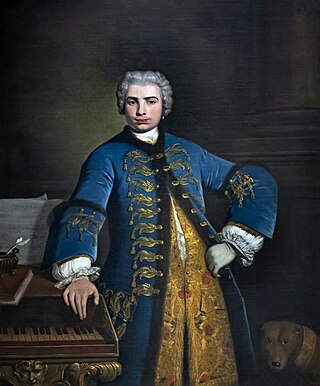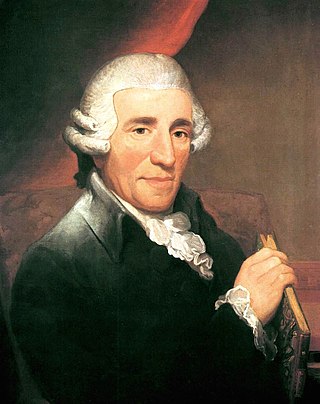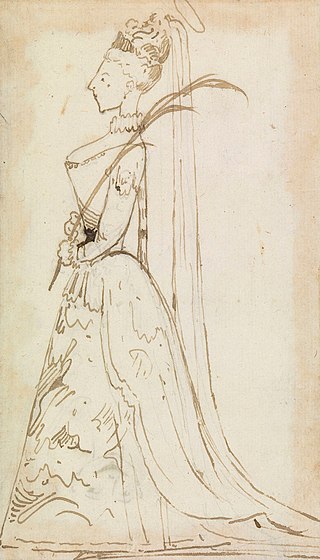
Farinelli was the stage name of Carlo Maria Michelangelo Nicola Broschi, a celebrated Italian castrato singer of the 18th century and one of the greatest singers in the history of opera. Farinelli has been described as having had soprano vocal range and as having sung the highest note customary at the time, C6.

Orlando furioso is an Italian epic poem by Ludovico Ariosto which has exerted a wide influence on later culture. The earliest version appeared in 1516, although the poem was not published in its complete form until 1532. Orlando furioso is a continuation of Matteo Maria Boiardo's unfinished romance Orlando innamorato. In its historical setting and characters, it shares some features with the Old French Chanson de Roland of the eleventh century, which tells of the death of Roland. The story is also a chivalric romance which stemmed from a tradition beginning in the late Middle Ages and continuing in popularity in the 16th century and well into the 17th.

Francesco Bernardi, known as Senesino, was a celebrated Italian contralto castrato, particularly remembered today for his long collaboration with the composer George Frideric Handel. He was also involved in a public scandal with the soprano Anastasia Robinson in 1724 which was circulated widely by the satirist Jonathan Swift, and inspired a number of anonymously written obscene, misogynistic, and at times sexually subversive epistles written between 1724 and 1736 which have become a topic of study among scholars of Restoration literature.

Pietro Antonio Domenico Trapassi, better known by his pseudonym of Pietro Metastasio, was an Italian poet and librettist, considered the most important writer of opera seria libretti.

Johann Adolph Hasse was an 18th-century German composer, singer and teacher of music. Immensely popular in his time, Hasse was best known for his prolific operatic output, though he also composed a considerable quantity of sacred music. Married to soprano Faustina Bordoni and a friend of librettist Pietro Metastasio, whose libretti he frequently set, Hasse was a pivotal figure in the development of opera seria and 18th-century music.

Opera seria is an Italian musical term which refers to the noble and "serious" style of Italian opera that predominated in Europe from the 1710s to about 1770. The term itself was rarely used at the time and only attained common usage once opera seria was becoming unfashionable and beginning to be viewed as something of a historical genre. The popular rival to opera seria was opera buffa, the 'comic' opera that took its cue from the improvisatory commedia dell'arte.

NicolaAntonio Giacinto Porpora was an Italian composer and teacher of singing of the Baroque era, whose most famous singing students were the castrati Farinelli and Caffarelli. Other students included composers Johann Adolph Hasse, Matteo Capranica and Joseph Haydn.

Orlando, usually known in modern times as Orlando furioso, is an opera in three acts by Antonio Vivaldi to an Italian libretto by Grazio Braccioli, based on Ludovico Ariosto's epic poem Orlando Furioso. The first performance of the opera was at the Teatro San Angelo, Venice, in November 1727. It is to be distinguished from an earlier Vivaldi opera of 1714, Orlando furioso, set to much the same libretto, once thought to be a revival of a 1713 opera by Giovanni Alberto Ristori but now considered by Vivaldian musicologists to be a fully-fledged opera by Vivaldi himself.

Orlando is an opera seria in three acts by George Frideric Handel written for the King's Theatre in London in 1733. The Italian libretto was adapted from Carlo Sigismondo Capece's L'Orlando after Ludovico Ariosto's Orlando Furioso, which was also the source of Handel's operas Alcina and Ariodante. More an artistic than a popular success at its first performances, Orlando is today recognised as a masterpiece.

Orlando paladino, Hob. 28/11, is an opera in three acts by Joseph Haydn which was first performed at Eszterháza on 6 December 1782. The libretto by Nunziato Porta is based on another libretto, Le pazzie d'Orlando, by Carlo Francesco Badini, itself inspired by Ariosto's epic poem Orlando furioso. The opera was described as a dramma eroicomico and the plot mixes heroic and comic elements. It was Haydn's most popular opera during his lifetime. While in Prague, Mozart conducted a few performances of the opera. The Pennsylvania Opera Theater presented the United States premiere of the work at the Trocadero Theatre, Philadelphia, in March 1982 with John Gilmore in the title role. More recently, staged performances have been given in 2009 at the Berlin State Opera with René Jacobs conducting, and in 2016 at the Zurich Opera House conducted by Gianluca Capuano. In 2023, Il Giardino Armonico conducted by Giovanni Antonini gave concert performances at the Gran Teatre del Liceu and the Teatro Real, with cast including Emőke Baráth, Nuria Rial, Alasdair Kent and Josh Lovell.

Carlo Scalzi was an Italian castrato who had an active performance career in major opera houses in Italy from 1718-1738. He was also heard in London in 1733–1734 where he notably created the role of Alceste in the world premiere of George Frideric Handel's Arianna in Creta. The librettist Pietro Metastasio described Scalzi as a "very unique singer" and likened his voice to that of the famous castrato Farinelli.

Angelica and Medoro was a popular subject for Romantic painters, composers and writers from the 16th until the 19th century. Angelica and Medoro are two characters from the 16th-century Italian epic Orlando Furioso by Ludovico Ariosto. Angelica was an Asian princess at the court of Charlemagne who fell in love with the Saracen knight Medoro, and eloped with him to China. While in the original work Orlando was the main character, many adaptations focused purely or mainly on the love between Angelica and Medoro, with the favourite scenes in paintings being Angelica nursing Medoro, and Angelica carving their names into a tree, a scene which was the theme of at least 25 paintings between 1577 and 1825.
The Real Compañía Ópera de Cámara de Barcelona orchestra (RCOC) is a Spanish early music ensemble based in Barcelona. It was founded by its conductor Juan Bautista Otero. The orchestra has been instrumental in reviving several long unperformed Baroque operas.

Sebastiano Biancardi, known by the pseudonym Domenico Lalli, was an Italian poet and librettist. Amongst the many libretti he produced, largely for the opera houses of Venice, were those for Vivaldi's Ottone in villa and Alessandro Scarlatti's Tigrane. A member of the Accademia degli Arcadi, he also wrote under his arcadian name "Ortanio". Lalli was born and raised in Naples as the adopted son of Fulvio Caracciolo but fled the city after being implicated in a bank fraud. After two years wandering about Italy in the company of Emanuele d'Astorga, he settled in Venice in 1710 and worked as the "house poet" of the Grimani family's theatres for the rest of his career. In addition to his stage works, Lalli published several volumes of poetry and a collection of biographies of the kings of Naples. He died in Venice at the age of 62.

Gli orti esperidi is a libretto by Metastasio set first in 1721 by Nicola Porpora, and performed 28 August 1721, at the Palazzo Reale. In 1751 Nicola Conforto set the libretto in honor of the Empress Maria Theresa of Austria, to celebrate the name day of the Spanish king Ferdinand VI on 30 May.

Sunhae Im is a South Korean soprano. She has been described as a bright and versatile lyric soprano with lightness and coloratura. She first gained her reputation in the field of early music and now performs a wide range of classical and non-classical music.

Erminia, Tancredi, Polidoro e Pastore (R.374.26) or more simply Erminia, is the last of the serenades by Italian composer Alessandro Scarlatti. Conceived for four voices, choir and orchestra, the work was created on the occasion of a wedding at the Palazzo Zevallos Stigliano in Naples on June 13, 1723, two years before the musician's death. The second part has gone astray in time and long considered lost or as an unfinished work. In the 2010s, fragments were found thanks to the Répertoire international des sources musicales.
L'Angelica is a serenata by João de Sousa Carvalho to a libretto by Metastasio previously set by other composers. The plot concerns how Angelica thwarts the noble Orlando and elopes with Medoro. The 1720 serenata Angelica e Medoro by Nicola Porpora is a setting of the same libretto.

Solimano is a Baroque opera in three acts by Davide Perez (1711–1778). A first version was premiered for the carnival in 1757 in the Palace of Ajuda in Lisbon. The revised version of 1768 performed for the birthday of Mariana Victoria of Spain is however much more widely known.

Maria Giustina Turcotti, sometimes shortened to Giustina Turcotti, was an Italian vocalist who had a career in opera. Sources vary in describing her voice type, some identifying her as a soprano and others a mezzo-soprano. She performed in opera houses in Italy from 1717 through 1746, and then toured Europe as a member of Pietro Mingotti's opera troupe from 1746 to 1750. She was a resident singer at the Bayreuth court opera; a position she held from 1750 until 1758 and then again from 1760 through 1763. After this period no record of the singer has been found.


















